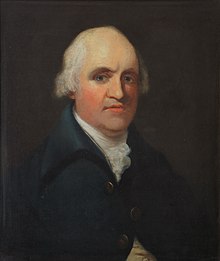|
James Pettit Andrews
James Pettit Andrews (1737[1]– 6 August 1797) was an English historian and antiquary. LifeHe was the younger son of Joseph Andrews of Shaw House, near Newbury in Berkshire, and his second wife Elizabeth Pettit; Sir Joseph Andrews, 1st Baronet (1727–1800) was his elder brother.[2] He was educated privately, and having taken to the law was one of the magistrates at the police court in Queen Square, Westminster, from 1792 to his death.[1] Andrews built himself the Strawberry Hill Gothic mansion of Donnington Grove, near the family home, in 1763, designed by John Chute. He sold the house in 1783.[2] He was a regular participant in the work of the Committee for the Relief of the Black Poor in the 1780s.[3] Andrews died at Brompton and was buried in Hampstead Church.[4] WorksHis major work was a History of Great Britain connected with the Chronology of Europe from Caesar's Invasion to Accession of Edward VI, in 2 volumes (London, 1794–1795). A portion of the history of England is given on one page, facing a general sketch of the contemporany history of Europe on the opposite page. He also wrote a History of Great Britain from Death of Henry VIII to Accession of James VI of Scotland – a continuation of Robert Henry's History of Great Britain, which left off at the death of Henry VIII – published in 1796 and again in 1806.[1] Andrews translated a German tragedy of Christoph Unzer with Henry James Pye. It was published in 1798 as The Inquisitor.[2][5] Others works include The Savages of Europe (London, 1764), a satire on the English which he translated from the French of Robert-Martin Lesuire (1737–1815) and Louvel; and Anecdotes Ancient and Modern (London, 1789), a collection of gossip.[1] FamilyAndrews married Anne, daughter of Thomas Penrose, rector of Newbury, and sister of Thomas Penrose the poet. He edited an edition (1781) of his brother-in-law's works.[2] References
|
||||||||||||
